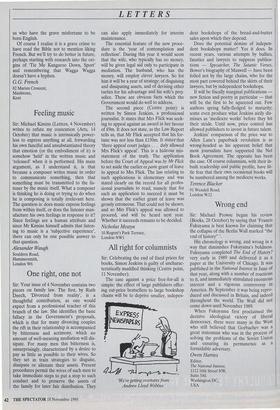Wrong end
Sir: Michael Prowse began his review (Books, 28 October) by saying that 'Francis Fukuyama is best known for claiming that the collapse of the Berlin Wall marked "the end of history" '.
His chronology is wrong, and wrong in a way that diminishes Fukuyama's boldness. Fukuyama completed The End of History? very early in 1989 and delivered it as a paper at the University of Chicago. It was published in the National Interest in June of that year, along with a number of reactions to it, and immediately stimulated enormous interest and a vigorous controversy in America. By September it was being repro- duced and discussed in Britain, and indeed throughout the world. The Wall did not come down until November 1989.
When Fukuyama first proclaimed the decisive ideological victory of liberal democracy, there were many in the West who still believed that Gorbachev was a great statesman who was in the process of solving the problems of the Soviet Union and ensuring its permanence as a formidable adversary.
Owen Harries
Editor, The National Interest, 1112 16th Street NW, Suite 540, Washington DC, USA


















































































 Previous page
Previous page